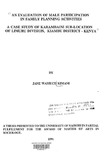| dc.description.abstract | This study evaluates male involvement in Family planning activities. This evaluation
was done through the testing of four main hypotheses based on the socio - cultural factors
thought to influence male involvement in family planning.
The study sample is composed of 198 adult males living in Karambaini sub-location,
Limuru division of Kiambu District. Systematic sampling was used in selecting the
respondents.
The key instrument of data collection was the interview schedule, but other methods such
as available data, key informants and simple observation were also used.
Descriptive statistics such as mean, mode, range and median were used in presenting data
pertaining to the background information of the respondents and the research site. In
relating independent to dependent variables, higher level of data analysis such as
contingency coefficient have been applied.
The findings of the study show that majority of the respondents in this study were poor
but they were not very traditional-oriented. Male respondents show a high level of
awareness of family planning methods but the actual adoption of these methods is found
to be low.
It is found that the relationship between leadership and use of modern contraceptives is
weak and insignificant, suggesting that promotive activities have to be intensified in
involving leaders in family planning. It is also found that respondents' level of education
does not influence their use of family planning methods but it influences use of modern
methods by their wives. Similarly, the respondents' annual family income does not
significantly influence the use of family planning.
It is shown that use of modern family planning methods does not conflict with traditional
cultural values, suggesting that the forces of social change are eroding most of the pro cultural
beliefs. However, a significant relationship was observed between respondents'
perception of children and their use of family planning methods.
Though there is a relationship between proximity to the health facilities and male
participation in family planning, this relationship is very weak indicating that males are
"not involved by the family planning staff in those clinics.
Lastly, the study found a strong relationship between males' knowledge about family
planning and their use of family planning methods.
Arising from these findings, it is recommended that male leaders are involved in family
planning seminars and courses because they constitute an influential group of people in
the community. Secondly, family planning programmes should discourage excessive use
of money in projects which are geared towards eliminating cultural barriers. The study
found that these cultural barriers are no longer a pressing problem. The family planning
staff should increase home visits and think of starting male clinics. Thirdly, promotion
of detailed family planning education is highly recommended and it should be integrated
with the formal education provided in schools. | en |

